Advanced Corporate Reporting (ACCT 5019) Integrated Reporting Analysis
VerifiedAdded on 2023/01/19
|16
|4377
|25
Report
AI Summary
This report provides a comprehensive analysis of integrated reporting, examining its emergence, contemporary issues, and existing reporting frameworks such as the Balance Scorecard, Triple Bottom Line, and Sustainability Reporting. It delves into the differences between integrated reporting (IR) and these frameworks, highlighting how IR overcomes the limitations of its predecessors by integrating financial and non-financial information. The report explores the rationale and outcomes of early IR adoption by companies like Novo Nordisk and South African businesses, the relevant accounting theories, and the main findings of prior research. It also discusses the implications and limitations of the research, including reasons for adopting IR in the absence of regulatory scrutiny and its contribution to stakeholder understanding. The report is based on the journal paper, “Integrated Reporting: Insights, gaps and an agenda for future research” (de Villiers et al. 2014), and addresses the challenges of integrating financial and non-financial aspects in a single report.
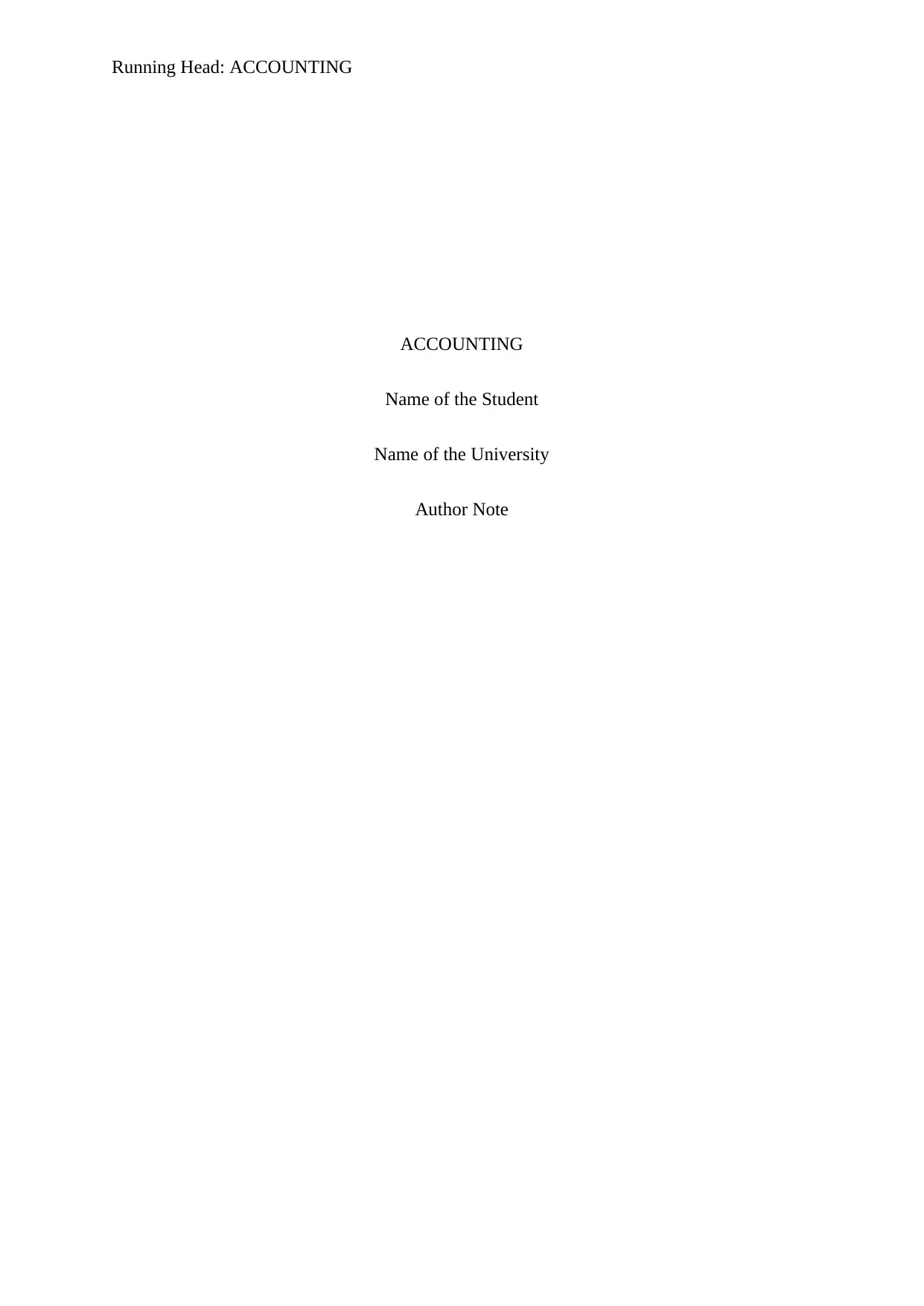
Running Head: ACCOUNTING
ACCOUNTING
Name of the Student
Name of the University
Author Note
ACCOUNTING
Name of the Student
Name of the University
Author Note
Paraphrase This Document
Need a fresh take? Get an instant paraphrase of this document with our AI Paraphraser
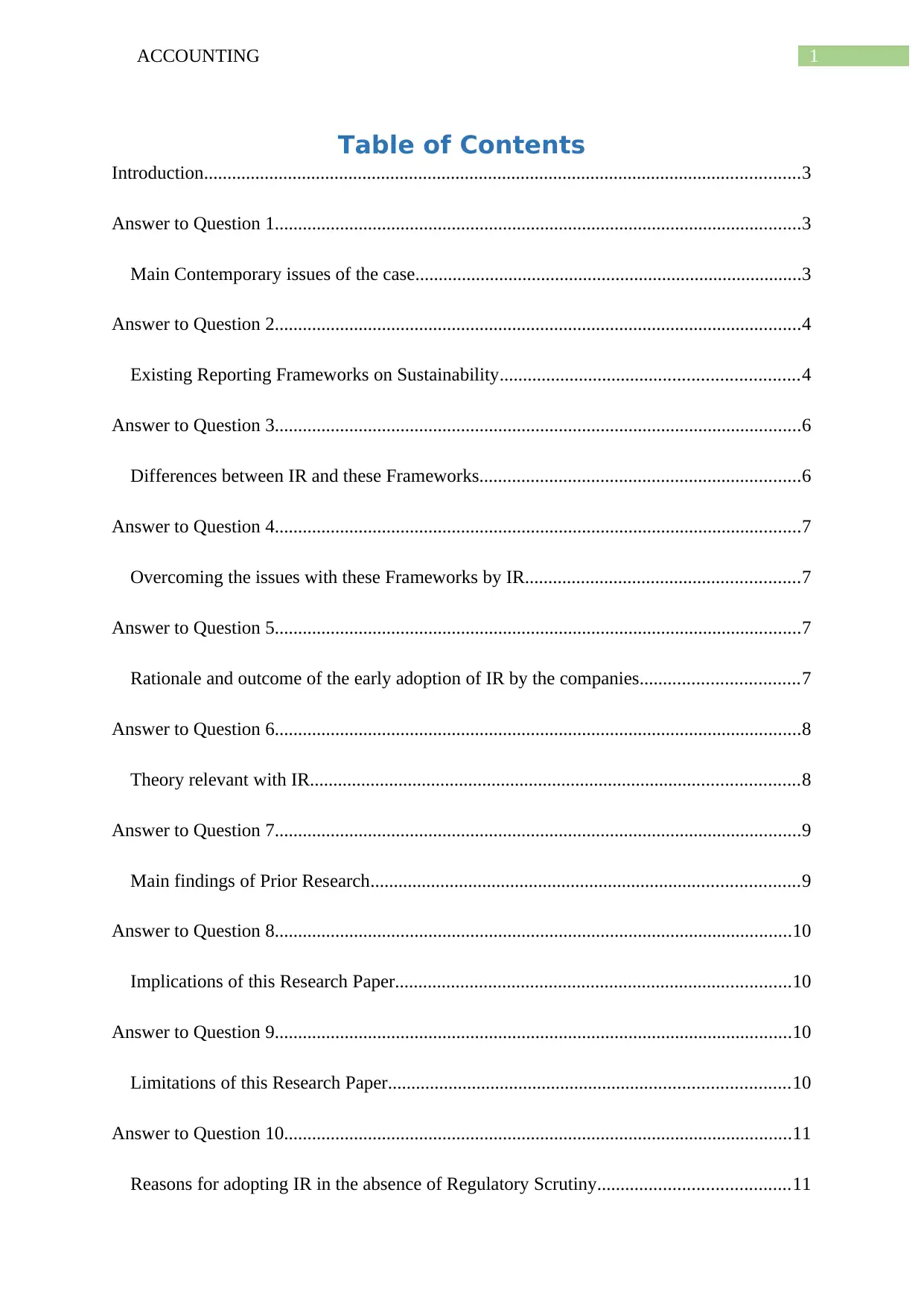
1ACCOUNTING
Table of Contents
Introduction................................................................................................................................3
Answer to Question 1.................................................................................................................3
Main Contemporary issues of the case...................................................................................3
Answer to Question 2.................................................................................................................4
Existing Reporting Frameworks on Sustainability................................................................4
Answer to Question 3.................................................................................................................6
Differences between IR and these Frameworks.....................................................................6
Answer to Question 4.................................................................................................................7
Overcoming the issues with these Frameworks by IR...........................................................7
Answer to Question 5.................................................................................................................7
Rationale and outcome of the early adoption of IR by the companies..................................7
Answer to Question 6.................................................................................................................8
Theory relevant with IR.........................................................................................................8
Answer to Question 7.................................................................................................................9
Main findings of Prior Research............................................................................................9
Answer to Question 8...............................................................................................................10
Implications of this Research Paper.....................................................................................10
Answer to Question 9...............................................................................................................10
Limitations of this Research Paper......................................................................................10
Answer to Question 10.............................................................................................................11
Reasons for adopting IR in the absence of Regulatory Scrutiny.........................................11
Table of Contents
Introduction................................................................................................................................3
Answer to Question 1.................................................................................................................3
Main Contemporary issues of the case...................................................................................3
Answer to Question 2.................................................................................................................4
Existing Reporting Frameworks on Sustainability................................................................4
Answer to Question 3.................................................................................................................6
Differences between IR and these Frameworks.....................................................................6
Answer to Question 4.................................................................................................................7
Overcoming the issues with these Frameworks by IR...........................................................7
Answer to Question 5.................................................................................................................7
Rationale and outcome of the early adoption of IR by the companies..................................7
Answer to Question 6.................................................................................................................8
Theory relevant with IR.........................................................................................................8
Answer to Question 7.................................................................................................................9
Main findings of Prior Research............................................................................................9
Answer to Question 8...............................................................................................................10
Implications of this Research Paper.....................................................................................10
Answer to Question 9...............................................................................................................10
Limitations of this Research Paper......................................................................................10
Answer to Question 10.............................................................................................................11
Reasons for adopting IR in the absence of Regulatory Scrutiny.........................................11
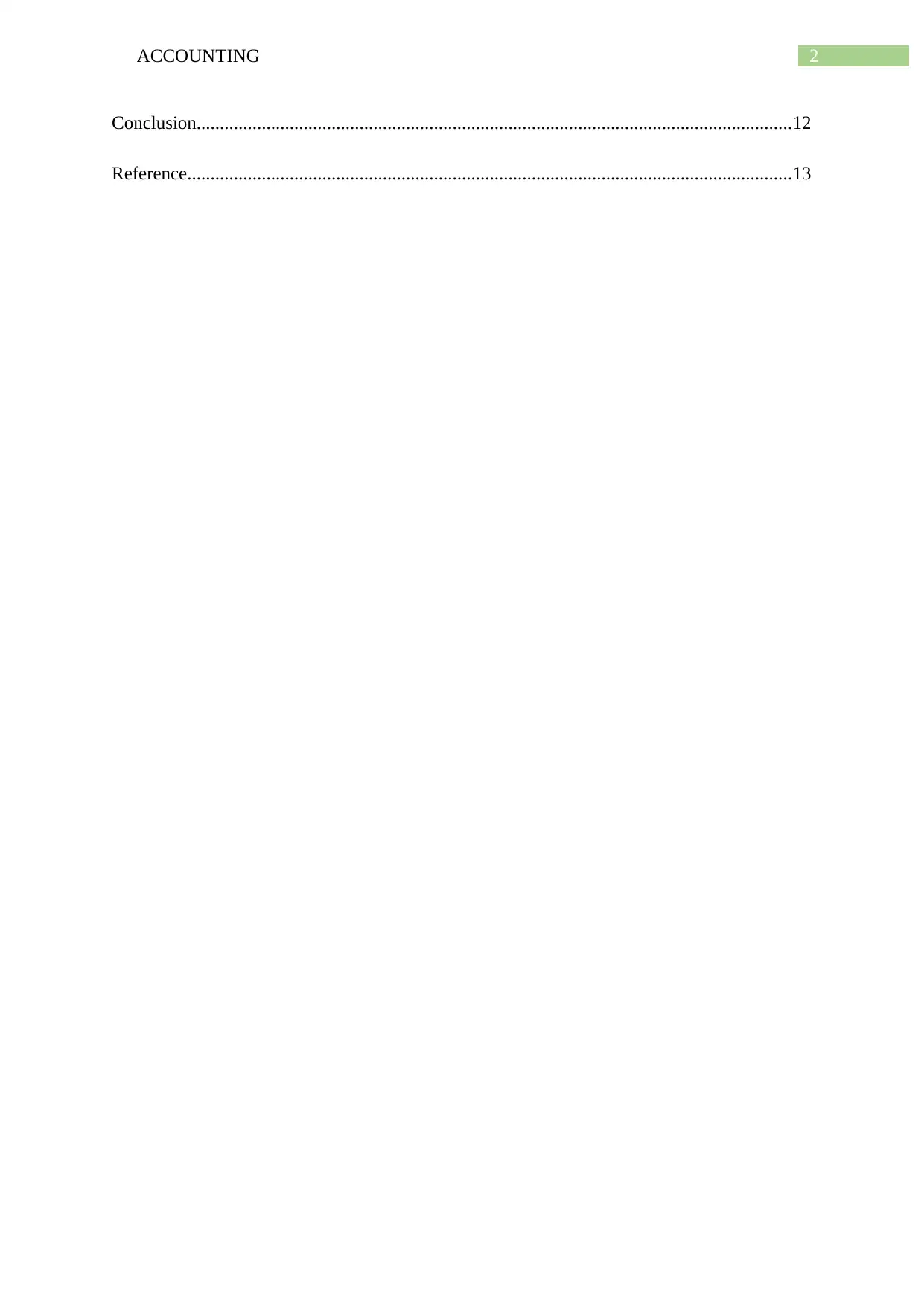
2ACCOUNTING
Conclusion................................................................................................................................12
Reference..................................................................................................................................13
Conclusion................................................................................................................................12
Reference..................................................................................................................................13
⊘ This is a preview!⊘
Do you want full access?
Subscribe today to unlock all pages.

Trusted by 1+ million students worldwide
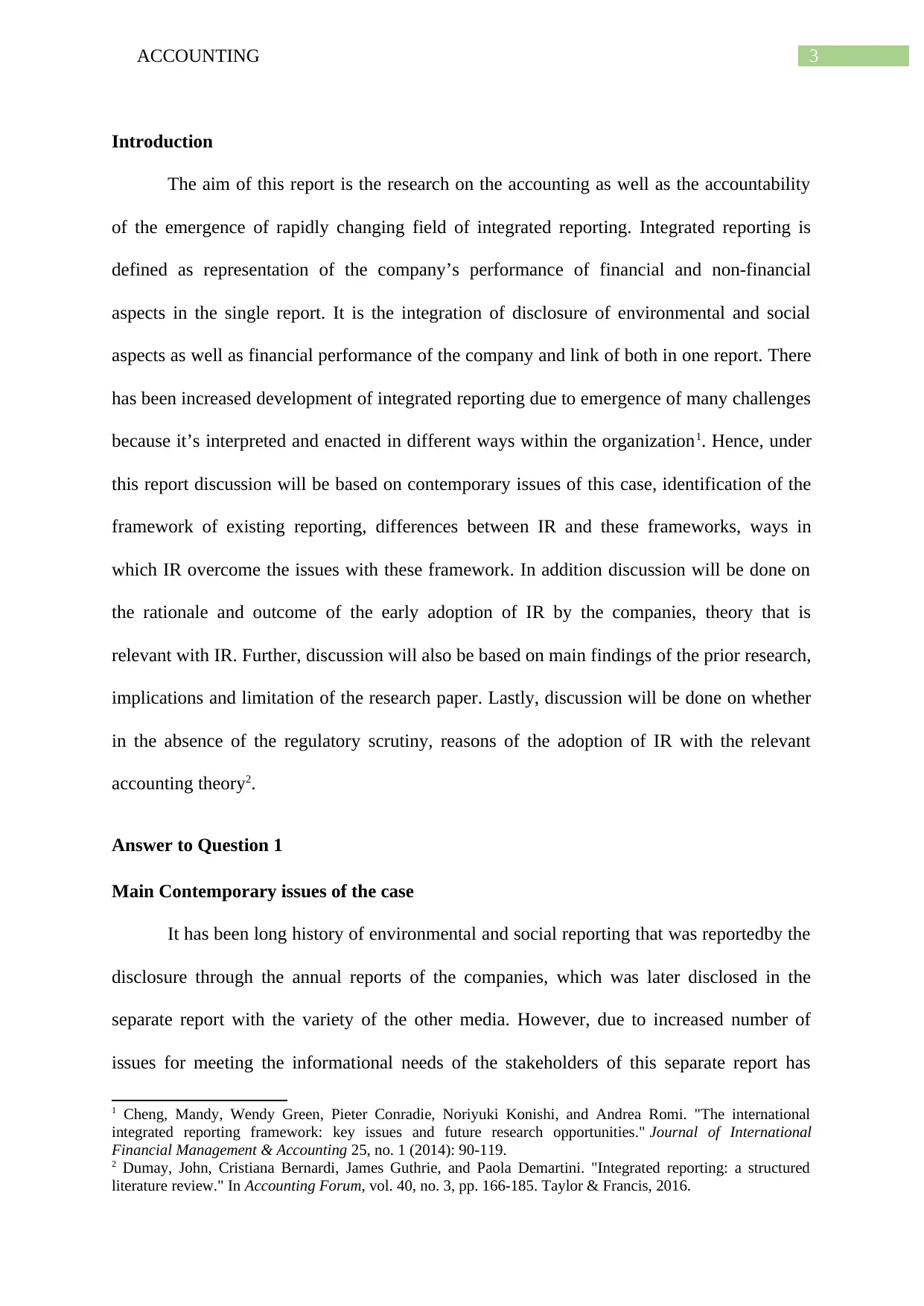
3ACCOUNTING
Introduction
The aim of this report is the research on the accounting as well as the accountability
of the emergence of rapidly changing field of integrated reporting. Integrated reporting is
defined as representation of the company’s performance of financial and non-financial
aspects in the single report. It is the integration of disclosure of environmental and social
aspects as well as financial performance of the company and link of both in one report. There
has been increased development of integrated reporting due to emergence of many challenges
because it’s interpreted and enacted in different ways within the organization1. Hence, under
this report discussion will be based on contemporary issues of this case, identification of the
framework of existing reporting, differences between IR and these frameworks, ways in
which IR overcome the issues with these framework. In addition discussion will be done on
the rationale and outcome of the early adoption of IR by the companies, theory that is
relevant with IR. Further, discussion will also be based on main findings of the prior research,
implications and limitation of the research paper. Lastly, discussion will be done on whether
in the absence of the regulatory scrutiny, reasons of the adoption of IR with the relevant
accounting theory2.
Answer to Question 1
Main Contemporary issues of the case
It has been long history of environmental and social reporting that was reportedby the
disclosure through the annual reports of the companies, which was later disclosed in the
separate report with the variety of the other media. However, due to increased number of
issues for meeting the informational needs of the stakeholders of this separate report has
1 Cheng, Mandy, Wendy Green, Pieter Conradie, Noriyuki Konishi, and Andrea Romi. "The international
integrated reporting framework: key issues and future research opportunities." Journal of International
Financial Management & Accounting 25, no. 1 (2014): 90-119.
2 Dumay, John, Cristiana Bernardi, James Guthrie, and Paola Demartini. "Integrated reporting: a structured
literature review." In Accounting Forum, vol. 40, no. 3, pp. 166-185. Taylor & Francis, 2016.
Introduction
The aim of this report is the research on the accounting as well as the accountability
of the emergence of rapidly changing field of integrated reporting. Integrated reporting is
defined as representation of the company’s performance of financial and non-financial
aspects in the single report. It is the integration of disclosure of environmental and social
aspects as well as financial performance of the company and link of both in one report. There
has been increased development of integrated reporting due to emergence of many challenges
because it’s interpreted and enacted in different ways within the organization1. Hence, under
this report discussion will be based on contemporary issues of this case, identification of the
framework of existing reporting, differences between IR and these frameworks, ways in
which IR overcome the issues with these framework. In addition discussion will be done on
the rationale and outcome of the early adoption of IR by the companies, theory that is
relevant with IR. Further, discussion will also be based on main findings of the prior research,
implications and limitation of the research paper. Lastly, discussion will be done on whether
in the absence of the regulatory scrutiny, reasons of the adoption of IR with the relevant
accounting theory2.
Answer to Question 1
Main Contemporary issues of the case
It has been long history of environmental and social reporting that was reportedby the
disclosure through the annual reports of the companies, which was later disclosed in the
separate report with the variety of the other media. However, due to increased number of
issues for meeting the informational needs of the stakeholders of this separate report has
1 Cheng, Mandy, Wendy Green, Pieter Conradie, Noriyuki Konishi, and Andrea Romi. "The international
integrated reporting framework: key issues and future research opportunities." Journal of International
Financial Management & Accounting 25, no. 1 (2014): 90-119.
2 Dumay, John, Cristiana Bernardi, James Guthrie, and Paola Demartini. "Integrated reporting: a structured
literature review." In Accounting Forum, vol. 40, no. 3, pp. 166-185. Taylor & Francis, 2016.
Paraphrase This Document
Need a fresh take? Get an instant paraphrase of this document with our AI Paraphraser
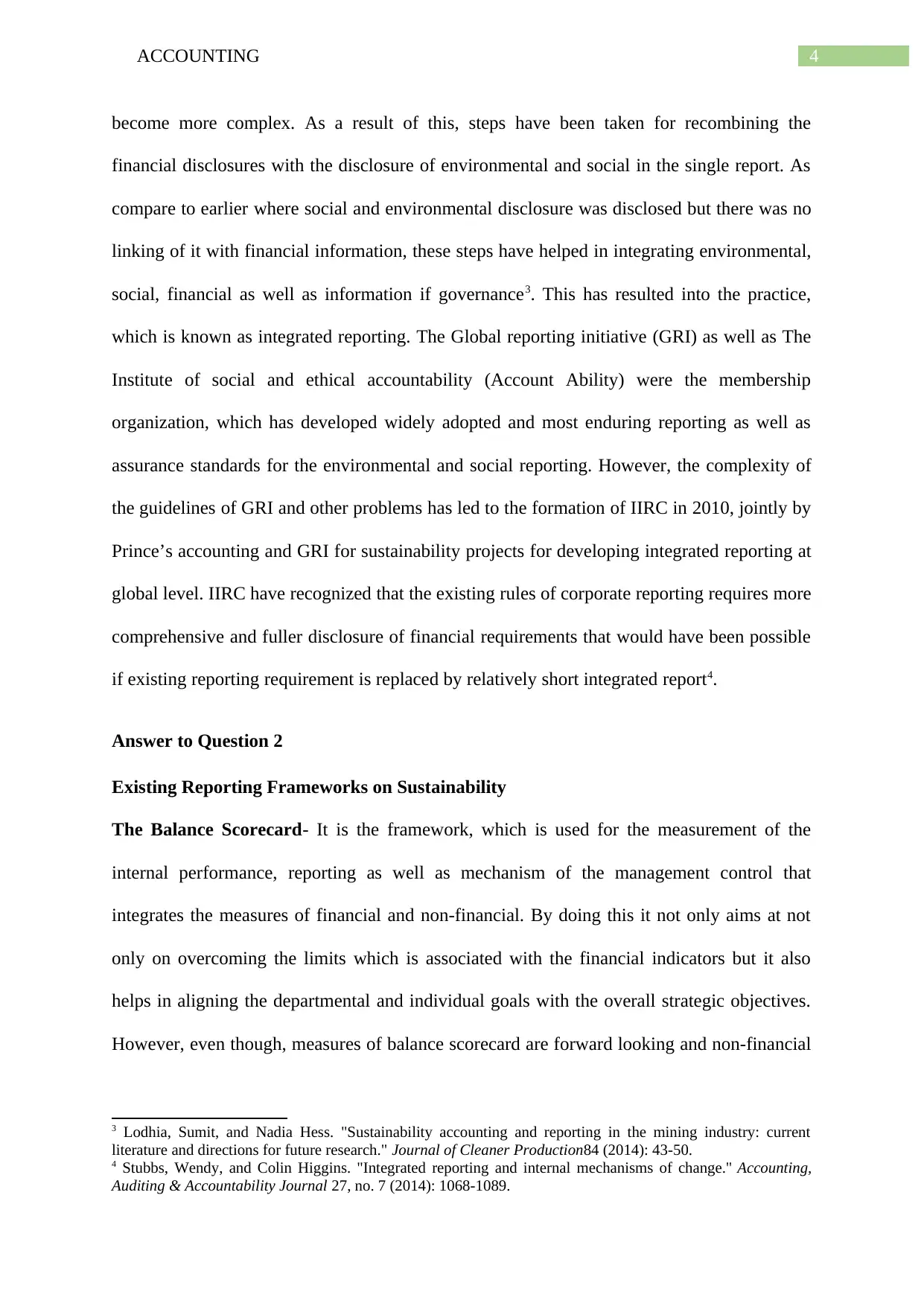
4ACCOUNTING
become more complex. As a result of this, steps have been taken for recombining the
financial disclosures with the disclosure of environmental and social in the single report. As
compare to earlier where social and environmental disclosure was disclosed but there was no
linking of it with financial information, these steps have helped in integrating environmental,
social, financial as well as information if governance3. This has resulted into the practice,
which is known as integrated reporting. The Global reporting initiative (GRI) as well as The
Institute of social and ethical accountability (Account Ability) were the membership
organization, which has developed widely adopted and most enduring reporting as well as
assurance standards for the environmental and social reporting. However, the complexity of
the guidelines of GRI and other problems has led to the formation of IIRC in 2010, jointly by
Prince’s accounting and GRI for sustainability projects for developing integrated reporting at
global level. IIRC have recognized that the existing rules of corporate reporting requires more
comprehensive and fuller disclosure of financial requirements that would have been possible
if existing reporting requirement is replaced by relatively short integrated report4.
Answer to Question 2
Existing Reporting Frameworks on Sustainability
The Balance Scorecard- It is the framework, which is used for the measurement of the
internal performance, reporting as well as mechanism of the management control that
integrates the measures of financial and non-financial. By doing this it not only aims at not
only on overcoming the limits which is associated with the financial indicators but it also
helps in aligning the departmental and individual goals with the overall strategic objectives.
However, even though, measures of balance scorecard are forward looking and non-financial
3 Lodhia, Sumit, and Nadia Hess. "Sustainability accounting and reporting in the mining industry: current
literature and directions for future research." Journal of Cleaner Production84 (2014): 43-50.
4 Stubbs, Wendy, and Colin Higgins. "Integrated reporting and internal mechanisms of change." Accounting,
Auditing & Accountability Journal 27, no. 7 (2014): 1068-1089.
become more complex. As a result of this, steps have been taken for recombining the
financial disclosures with the disclosure of environmental and social in the single report. As
compare to earlier where social and environmental disclosure was disclosed but there was no
linking of it with financial information, these steps have helped in integrating environmental,
social, financial as well as information if governance3. This has resulted into the practice,
which is known as integrated reporting. The Global reporting initiative (GRI) as well as The
Institute of social and ethical accountability (Account Ability) were the membership
organization, which has developed widely adopted and most enduring reporting as well as
assurance standards for the environmental and social reporting. However, the complexity of
the guidelines of GRI and other problems has led to the formation of IIRC in 2010, jointly by
Prince’s accounting and GRI for sustainability projects for developing integrated reporting at
global level. IIRC have recognized that the existing rules of corporate reporting requires more
comprehensive and fuller disclosure of financial requirements that would have been possible
if existing reporting requirement is replaced by relatively short integrated report4.
Answer to Question 2
Existing Reporting Frameworks on Sustainability
The Balance Scorecard- It is the framework, which is used for the measurement of the
internal performance, reporting as well as mechanism of the management control that
integrates the measures of financial and non-financial. By doing this it not only aims at not
only on overcoming the limits which is associated with the financial indicators but it also
helps in aligning the departmental and individual goals with the overall strategic objectives.
However, even though, measures of balance scorecard are forward looking and non-financial
3 Lodhia, Sumit, and Nadia Hess. "Sustainability accounting and reporting in the mining industry: current
literature and directions for future research." Journal of Cleaner Production84 (2014): 43-50.
4 Stubbs, Wendy, and Colin Higgins. "Integrated reporting and internal mechanisms of change." Accounting,
Auditing & Accountability Journal 27, no. 7 (2014): 1068-1089.
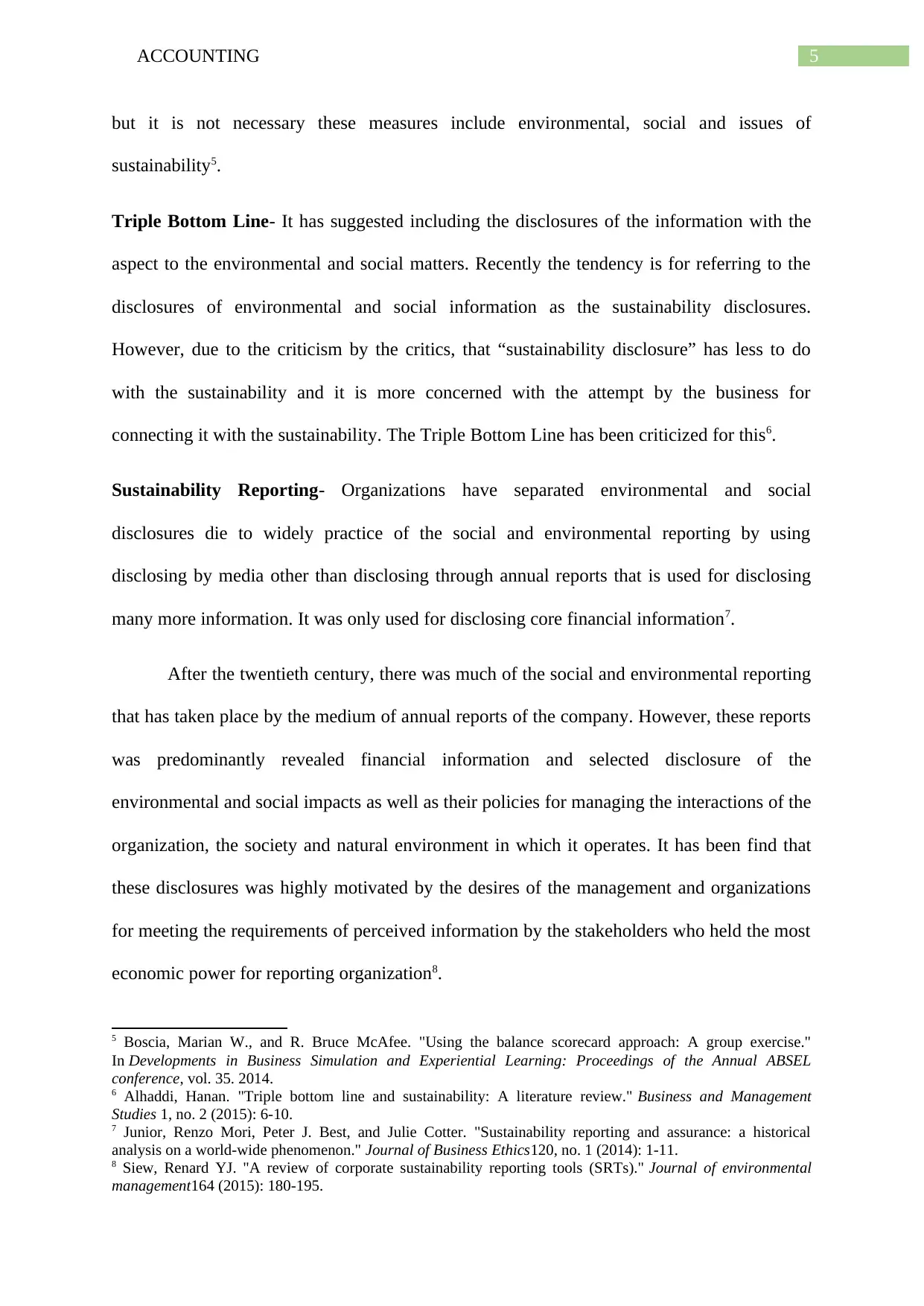
5ACCOUNTING
but it is not necessary these measures include environmental, social and issues of
sustainability5.
Triple Bottom Line- It has suggested including the disclosures of the information with the
aspect to the environmental and social matters. Recently the tendency is for referring to the
disclosures of environmental and social information as the sustainability disclosures.
However, due to the criticism by the critics, that “sustainability disclosure” has less to do
with the sustainability and it is more concerned with the attempt by the business for
connecting it with the sustainability. The Triple Bottom Line has been criticized for this6.
Sustainability Reporting- Organizations have separated environmental and social
disclosures die to widely practice of the social and environmental reporting by using
disclosing by media other than disclosing through annual reports that is used for disclosing
many more information. It was only used for disclosing core financial information7.
After the twentieth century, there was much of the social and environmental reporting
that has taken place by the medium of annual reports of the company. However, these reports
was predominantly revealed financial information and selected disclosure of the
environmental and social impacts as well as their policies for managing the interactions of the
organization, the society and natural environment in which it operates. It has been find that
these disclosures was highly motivated by the desires of the management and organizations
for meeting the requirements of perceived information by the stakeholders who held the most
economic power for reporting organization8.
5 Boscia, Marian W., and R. Bruce McAfee. "Using the balance scorecard approach: A group exercise."
In Developments in Business Simulation and Experiential Learning: Proceedings of the Annual ABSEL
conference, vol. 35. 2014.
6 Alhaddi, Hanan. "Triple bottom line and sustainability: A literature review." Business and Management
Studies 1, no. 2 (2015): 6-10.
7 Junior, Renzo Mori, Peter J. Best, and Julie Cotter. "Sustainability reporting and assurance: a historical
analysis on a world-wide phenomenon." Journal of Business Ethics120, no. 1 (2014): 1-11.
8 Siew, Renard YJ. "A review of corporate sustainability reporting tools (SRTs)." Journal of environmental
management164 (2015): 180-195.
but it is not necessary these measures include environmental, social and issues of
sustainability5.
Triple Bottom Line- It has suggested including the disclosures of the information with the
aspect to the environmental and social matters. Recently the tendency is for referring to the
disclosures of environmental and social information as the sustainability disclosures.
However, due to the criticism by the critics, that “sustainability disclosure” has less to do
with the sustainability and it is more concerned with the attempt by the business for
connecting it with the sustainability. The Triple Bottom Line has been criticized for this6.
Sustainability Reporting- Organizations have separated environmental and social
disclosures die to widely practice of the social and environmental reporting by using
disclosing by media other than disclosing through annual reports that is used for disclosing
many more information. It was only used for disclosing core financial information7.
After the twentieth century, there was much of the social and environmental reporting
that has taken place by the medium of annual reports of the company. However, these reports
was predominantly revealed financial information and selected disclosure of the
environmental and social impacts as well as their policies for managing the interactions of the
organization, the society and natural environment in which it operates. It has been find that
these disclosures was highly motivated by the desires of the management and organizations
for meeting the requirements of perceived information by the stakeholders who held the most
economic power for reporting organization8.
5 Boscia, Marian W., and R. Bruce McAfee. "Using the balance scorecard approach: A group exercise."
In Developments in Business Simulation and Experiential Learning: Proceedings of the Annual ABSEL
conference, vol. 35. 2014.
6 Alhaddi, Hanan. "Triple bottom line and sustainability: A literature review." Business and Management
Studies 1, no. 2 (2015): 6-10.
7 Junior, Renzo Mori, Peter J. Best, and Julie Cotter. "Sustainability reporting and assurance: a historical
analysis on a world-wide phenomenon." Journal of Business Ethics120, no. 1 (2014): 1-11.
8 Siew, Renard YJ. "A review of corporate sustainability reporting tools (SRTs)." Journal of environmental
management164 (2015): 180-195.
⊘ This is a preview!⊘
Do you want full access?
Subscribe today to unlock all pages.

Trusted by 1+ million students worldwide
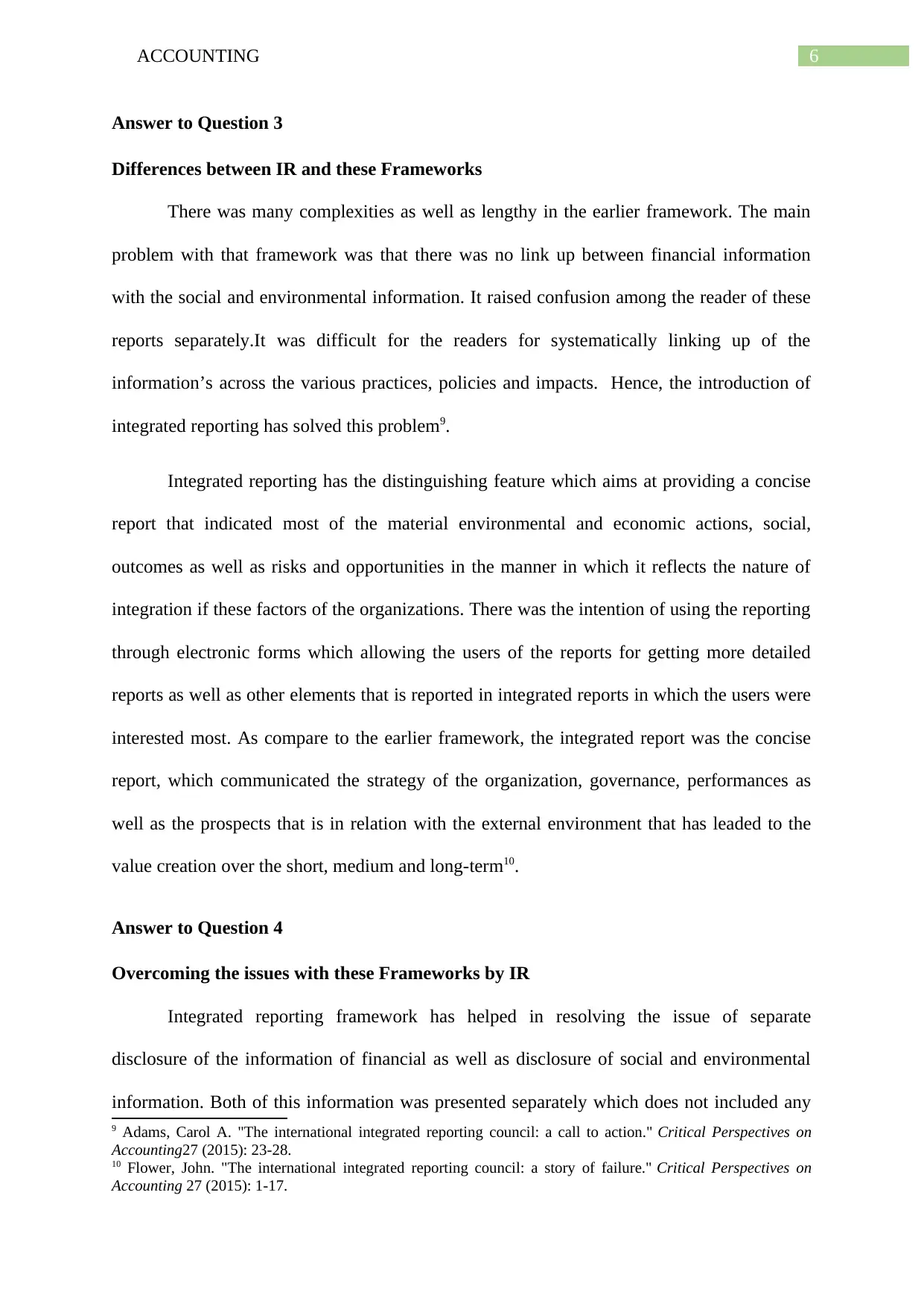
6ACCOUNTING
Answer to Question 3
Differences between IR and these Frameworks
There was many complexities as well as lengthy in the earlier framework. The main
problem with that framework was that there was no link up between financial information
with the social and environmental information. It raised confusion among the reader of these
reports separately.It was difficult for the readers for systematically linking up of the
information’s across the various practices, policies and impacts. Hence, the introduction of
integrated reporting has solved this problem9.
Integrated reporting has the distinguishing feature which aims at providing a concise
report that indicated most of the material environmental and economic actions, social,
outcomes as well as risks and opportunities in the manner in which it reflects the nature of
integration if these factors of the organizations. There was the intention of using the reporting
through electronic forms which allowing the users of the reports for getting more detailed
reports as well as other elements that is reported in integrated reports in which the users were
interested most. As compare to the earlier framework, the integrated report was the concise
report, which communicated the strategy of the organization, governance, performances as
well as the prospects that is in relation with the external environment that has leaded to the
value creation over the short, medium and long-term10.
Answer to Question 4
Overcoming the issues with these Frameworks by IR
Integrated reporting framework has helped in resolving the issue of separate
disclosure of the information of financial as well as disclosure of social and environmental
information. Both of this information was presented separately which does not included any
9 Adams, Carol A. "The international integrated reporting council: a call to action." Critical Perspectives on
Accounting27 (2015): 23-28.
10 Flower, John. "The international integrated reporting council: a story of failure." Critical Perspectives on
Accounting 27 (2015): 1-17.
Answer to Question 3
Differences between IR and these Frameworks
There was many complexities as well as lengthy in the earlier framework. The main
problem with that framework was that there was no link up between financial information
with the social and environmental information. It raised confusion among the reader of these
reports separately.It was difficult for the readers for systematically linking up of the
information’s across the various practices, policies and impacts. Hence, the introduction of
integrated reporting has solved this problem9.
Integrated reporting has the distinguishing feature which aims at providing a concise
report that indicated most of the material environmental and economic actions, social,
outcomes as well as risks and opportunities in the manner in which it reflects the nature of
integration if these factors of the organizations. There was the intention of using the reporting
through electronic forms which allowing the users of the reports for getting more detailed
reports as well as other elements that is reported in integrated reports in which the users were
interested most. As compare to the earlier framework, the integrated report was the concise
report, which communicated the strategy of the organization, governance, performances as
well as the prospects that is in relation with the external environment that has leaded to the
value creation over the short, medium and long-term10.
Answer to Question 4
Overcoming the issues with these Frameworks by IR
Integrated reporting framework has helped in resolving the issue of separate
disclosure of the information of financial as well as disclosure of social and environmental
information. Both of this information was presented separately which does not included any
9 Adams, Carol A. "The international integrated reporting council: a call to action." Critical Perspectives on
Accounting27 (2015): 23-28.
10 Flower, John. "The international integrated reporting council: a story of failure." Critical Perspectives on
Accounting 27 (2015): 1-17.
Paraphrase This Document
Need a fresh take? Get an instant paraphrase of this document with our AI Paraphraser
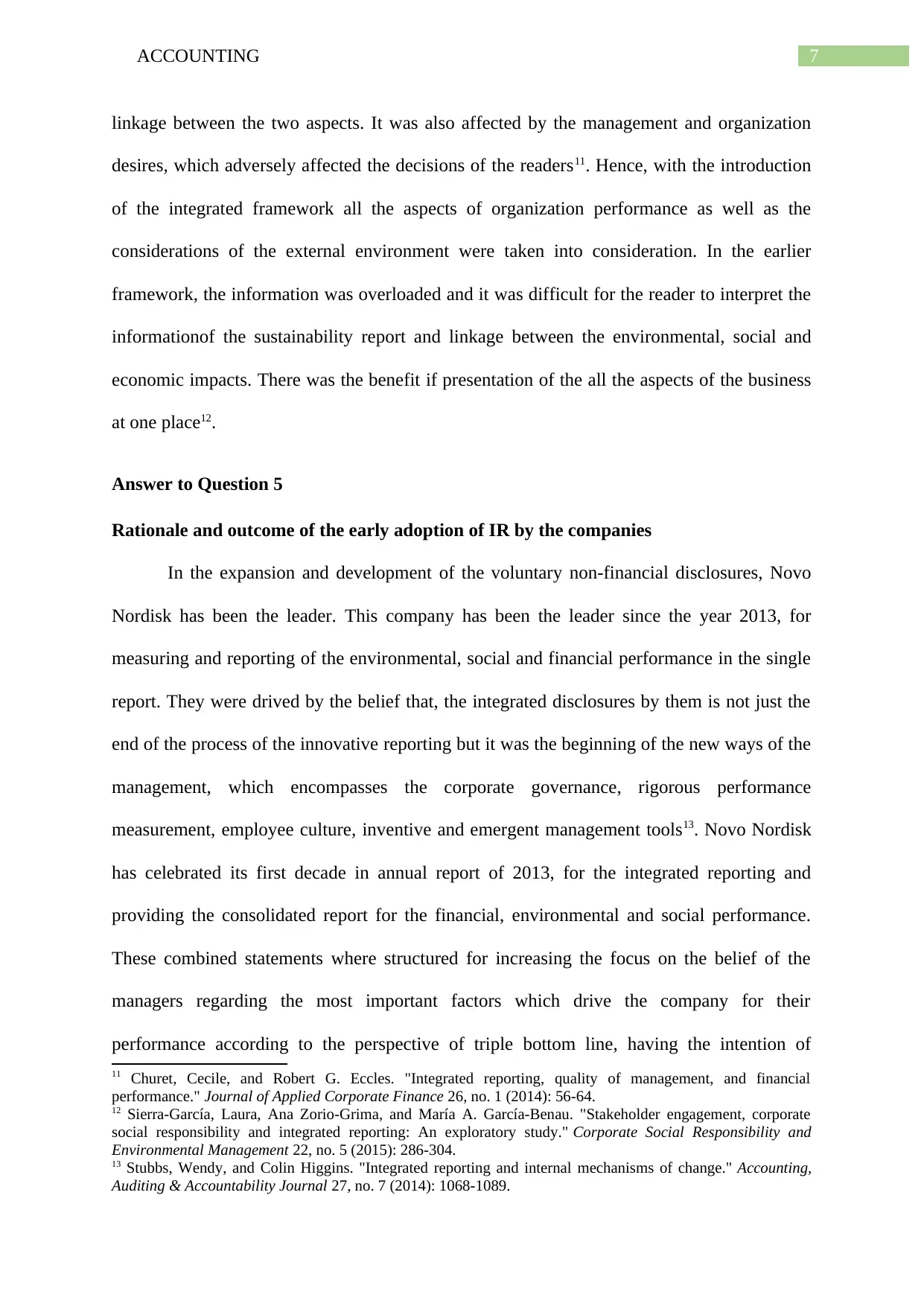
7ACCOUNTING
linkage between the two aspects. It was also affected by the management and organization
desires, which adversely affected the decisions of the readers11. Hence, with the introduction
of the integrated framework all the aspects of organization performance as well as the
considerations of the external environment were taken into consideration. In the earlier
framework, the information was overloaded and it was difficult for the reader to interpret the
informationof the sustainability report and linkage between the environmental, social and
economic impacts. There was the benefit if presentation of the all the aspects of the business
at one place12.
Answer to Question 5
Rationale and outcome of the early adoption of IR by the companies
In the expansion and development of the voluntary non-financial disclosures, Novo
Nordisk has been the leader. This company has been the leader since the year 2013, for
measuring and reporting of the environmental, social and financial performance in the single
report. They were drived by the belief that, the integrated disclosures by them is not just the
end of the process of the innovative reporting but it was the beginning of the new ways of the
management, which encompasses the corporate governance, rigorous performance
measurement, employee culture, inventive and emergent management tools13. Novo Nordisk
has celebrated its first decade in annual report of 2013, for the integrated reporting and
providing the consolidated report for the financial, environmental and social performance.
These combined statements where structured for increasing the focus on the belief of the
managers regarding the most important factors which drive the company for their
performance according to the perspective of triple bottom line, having the intention of
11 Churet, Cecile, and Robert G. Eccles. "Integrated reporting, quality of management, and financial
performance." Journal of Applied Corporate Finance 26, no. 1 (2014): 56-64.
12 Sierra‐García, Laura, Ana Zorio‐Grima, and María A. García‐Benau. "Stakeholder engagement, corporate
social responsibility and integrated reporting: An exploratory study." Corporate Social Responsibility and
Environmental Management 22, no. 5 (2015): 286-304.
13 Stubbs, Wendy, and Colin Higgins. "Integrated reporting and internal mechanisms of change." Accounting,
Auditing & Accountability Journal 27, no. 7 (2014): 1068-1089.
linkage between the two aspects. It was also affected by the management and organization
desires, which adversely affected the decisions of the readers11. Hence, with the introduction
of the integrated framework all the aspects of organization performance as well as the
considerations of the external environment were taken into consideration. In the earlier
framework, the information was overloaded and it was difficult for the reader to interpret the
informationof the sustainability report and linkage between the environmental, social and
economic impacts. There was the benefit if presentation of the all the aspects of the business
at one place12.
Answer to Question 5
Rationale and outcome of the early adoption of IR by the companies
In the expansion and development of the voluntary non-financial disclosures, Novo
Nordisk has been the leader. This company has been the leader since the year 2013, for
measuring and reporting of the environmental, social and financial performance in the single
report. They were drived by the belief that, the integrated disclosures by them is not just the
end of the process of the innovative reporting but it was the beginning of the new ways of the
management, which encompasses the corporate governance, rigorous performance
measurement, employee culture, inventive and emergent management tools13. Novo Nordisk
has celebrated its first decade in annual report of 2013, for the integrated reporting and
providing the consolidated report for the financial, environmental and social performance.
These combined statements where structured for increasing the focus on the belief of the
managers regarding the most important factors which drive the company for their
performance according to the perspective of triple bottom line, having the intention of
11 Churet, Cecile, and Robert G. Eccles. "Integrated reporting, quality of management, and financial
performance." Journal of Applied Corporate Finance 26, no. 1 (2014): 56-64.
12 Sierra‐García, Laura, Ana Zorio‐Grima, and María A. García‐Benau. "Stakeholder engagement, corporate
social responsibility and integrated reporting: An exploratory study." Corporate Social Responsibility and
Environmental Management 22, no. 5 (2015): 286-304.
13 Stubbs, Wendy, and Colin Higgins. "Integrated reporting and internal mechanisms of change." Accounting,
Auditing & Accountability Journal 27, no. 7 (2014): 1068-1089.
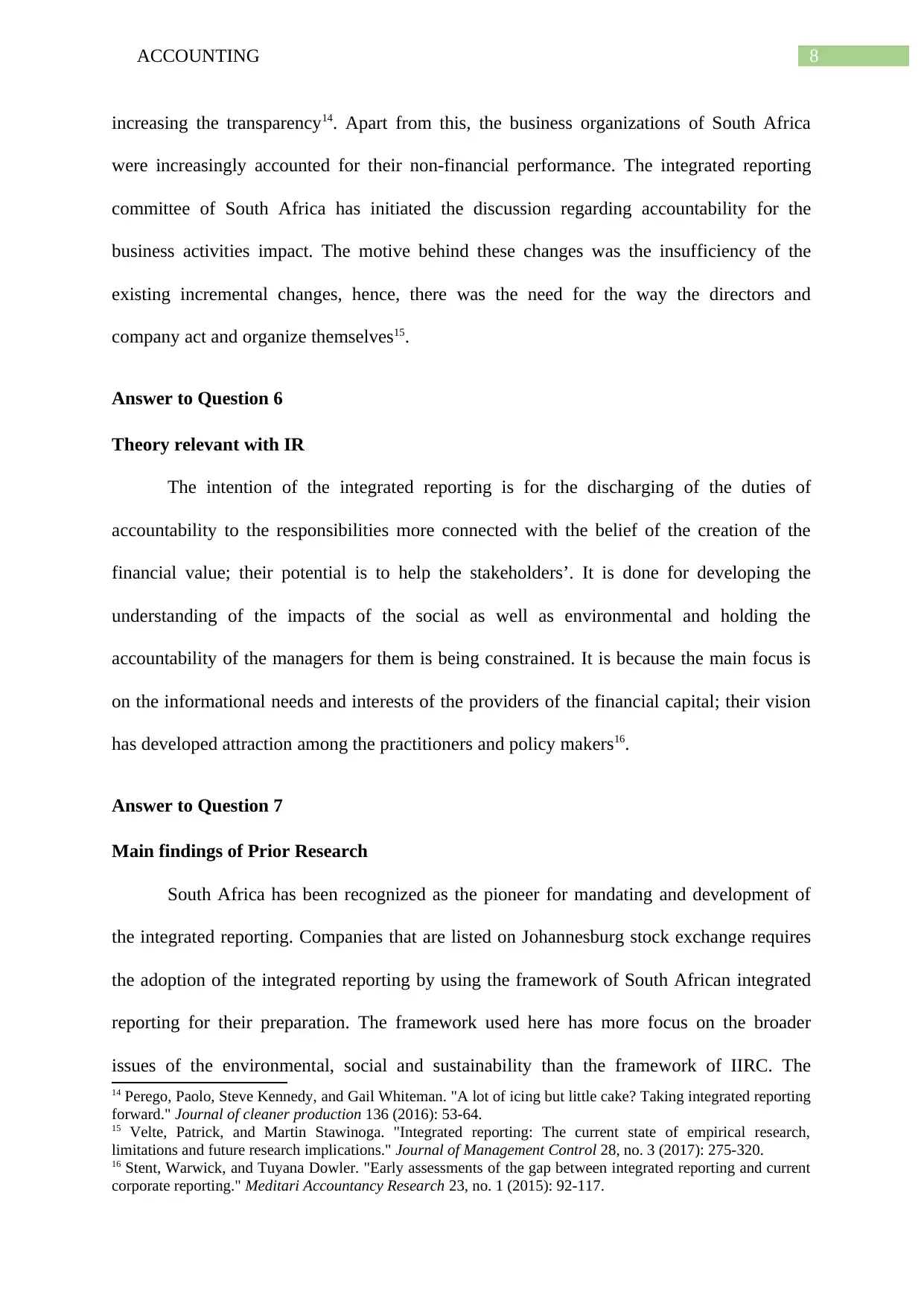
8ACCOUNTING
increasing the transparency14. Apart from this, the business organizations of South Africa
were increasingly accounted for their non-financial performance. The integrated reporting
committee of South Africa has initiated the discussion regarding accountability for the
business activities impact. The motive behind these changes was the insufficiency of the
existing incremental changes, hence, there was the need for the way the directors and
company act and organize themselves15.
Answer to Question 6
Theory relevant with IR
The intention of the integrated reporting is for the discharging of the duties of
accountability to the responsibilities more connected with the belief of the creation of the
financial value; their potential is to help the stakeholders’. It is done for developing the
understanding of the impacts of the social as well as environmental and holding the
accountability of the managers for them is being constrained. It is because the main focus is
on the informational needs and interests of the providers of the financial capital; their vision
has developed attraction among the practitioners and policy makers16.
Answer to Question 7
Main findings of Prior Research
South Africa has been recognized as the pioneer for mandating and development of
the integrated reporting. Companies that are listed on Johannesburg stock exchange requires
the adoption of the integrated reporting by using the framework of South African integrated
reporting for their preparation. The framework used here has more focus on the broader
issues of the environmental, social and sustainability than the framework of IIRC. The
14 Perego, Paolo, Steve Kennedy, and Gail Whiteman. "A lot of icing but little cake? Taking integrated reporting
forward." Journal of cleaner production 136 (2016): 53-64.
15 Velte, Patrick, and Martin Stawinoga. "Integrated reporting: The current state of empirical research,
limitations and future research implications." Journal of Management Control 28, no. 3 (2017): 275-320.
16 Stent, Warwick, and Tuyana Dowler. "Early assessments of the gap between integrated reporting and current
corporate reporting." Meditari Accountancy Research 23, no. 1 (2015): 92-117.
increasing the transparency14. Apart from this, the business organizations of South Africa
were increasingly accounted for their non-financial performance. The integrated reporting
committee of South Africa has initiated the discussion regarding accountability for the
business activities impact. The motive behind these changes was the insufficiency of the
existing incremental changes, hence, there was the need for the way the directors and
company act and organize themselves15.
Answer to Question 6
Theory relevant with IR
The intention of the integrated reporting is for the discharging of the duties of
accountability to the responsibilities more connected with the belief of the creation of the
financial value; their potential is to help the stakeholders’. It is done for developing the
understanding of the impacts of the social as well as environmental and holding the
accountability of the managers for them is being constrained. It is because the main focus is
on the informational needs and interests of the providers of the financial capital; their vision
has developed attraction among the practitioners and policy makers16.
Answer to Question 7
Main findings of Prior Research
South Africa has been recognized as the pioneer for mandating and development of
the integrated reporting. Companies that are listed on Johannesburg stock exchange requires
the adoption of the integrated reporting by using the framework of South African integrated
reporting for their preparation. The framework used here has more focus on the broader
issues of the environmental, social and sustainability than the framework of IIRC. The
14 Perego, Paolo, Steve Kennedy, and Gail Whiteman. "A lot of icing but little cake? Taking integrated reporting
forward." Journal of cleaner production 136 (2016): 53-64.
15 Velte, Patrick, and Martin Stawinoga. "Integrated reporting: The current state of empirical research,
limitations and future research implications." Journal of Management Control 28, no. 3 (2017): 275-320.
16 Stent, Warwick, and Tuyana Dowler. "Early assessments of the gap between integrated reporting and current
corporate reporting." Meditari Accountancy Research 23, no. 1 (2015): 92-117.
⊘ This is a preview!⊘
Do you want full access?
Subscribe today to unlock all pages.

Trusted by 1+ million students worldwide
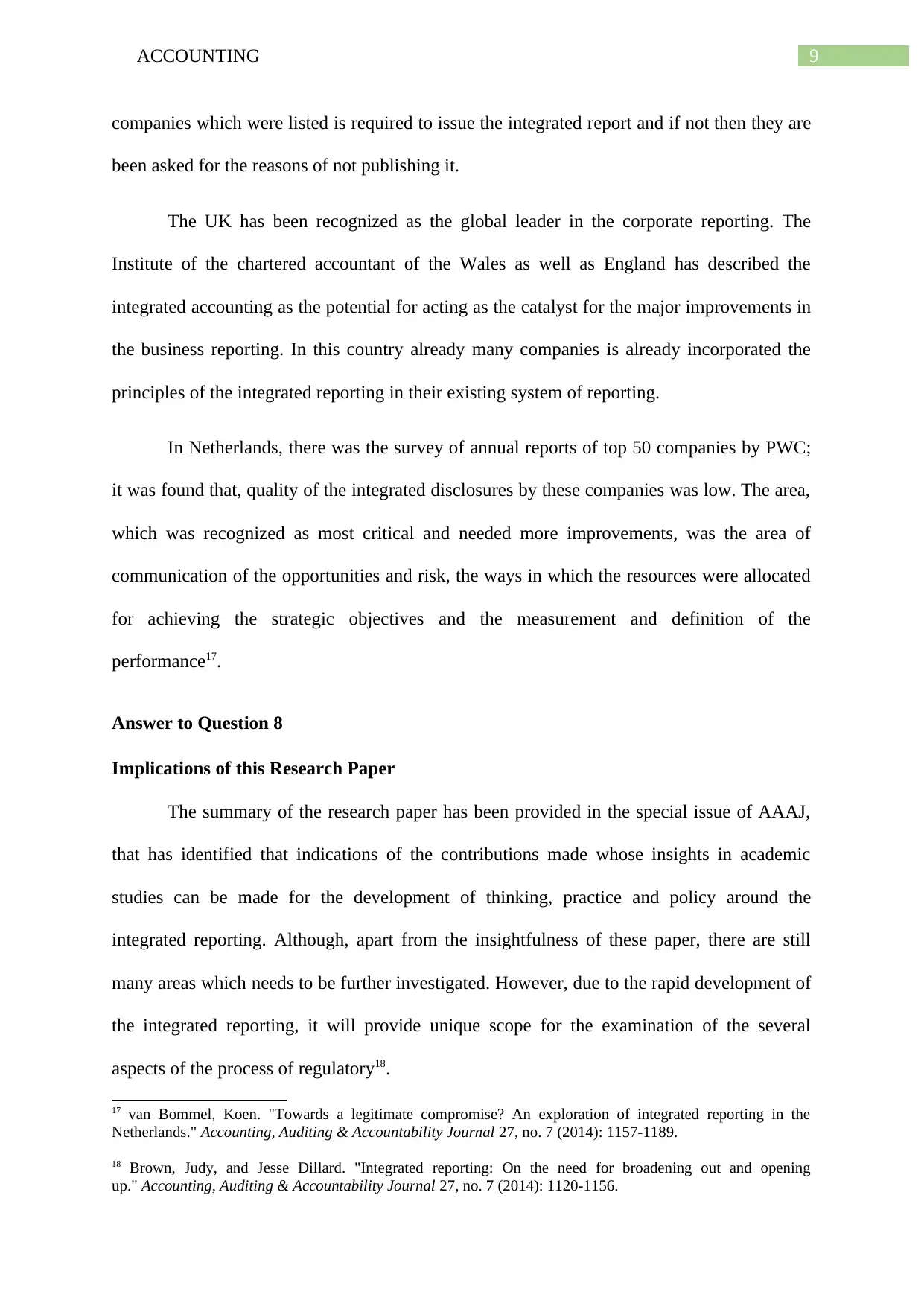
9ACCOUNTING
companies which were listed is required to issue the integrated report and if not then they are
been asked for the reasons of not publishing it.
The UK has been recognized as the global leader in the corporate reporting. The
Institute of the chartered accountant of the Wales as well as England has described the
integrated accounting as the potential for acting as the catalyst for the major improvements in
the business reporting. In this country already many companies is already incorporated the
principles of the integrated reporting in their existing system of reporting.
In Netherlands, there was the survey of annual reports of top 50 companies by PWC;
it was found that, quality of the integrated disclosures by these companies was low. The area,
which was recognized as most critical and needed more improvements, was the area of
communication of the opportunities and risk, the ways in which the resources were allocated
for achieving the strategic objectives and the measurement and definition of the
performance17.
Answer to Question 8
Implications of this Research Paper
The summary of the research paper has been provided in the special issue of AAAJ,
that has identified that indications of the contributions made whose insights in academic
studies can be made for the development of thinking, practice and policy around the
integrated reporting. Although, apart from the insightfulness of these paper, there are still
many areas which needs to be further investigated. However, due to the rapid development of
the integrated reporting, it will provide unique scope for the examination of the several
aspects of the process of regulatory18.
17 van Bommel, Koen. "Towards a legitimate compromise? An exploration of integrated reporting in the
Netherlands." Accounting, Auditing & Accountability Journal 27, no. 7 (2014): 1157-1189.
18 Brown, Judy, and Jesse Dillard. "Integrated reporting: On the need for broadening out and opening
up." Accounting, Auditing & Accountability Journal 27, no. 7 (2014): 1120-1156.
companies which were listed is required to issue the integrated report and if not then they are
been asked for the reasons of not publishing it.
The UK has been recognized as the global leader in the corporate reporting. The
Institute of the chartered accountant of the Wales as well as England has described the
integrated accounting as the potential for acting as the catalyst for the major improvements in
the business reporting. In this country already many companies is already incorporated the
principles of the integrated reporting in their existing system of reporting.
In Netherlands, there was the survey of annual reports of top 50 companies by PWC;
it was found that, quality of the integrated disclosures by these companies was low. The area,
which was recognized as most critical and needed more improvements, was the area of
communication of the opportunities and risk, the ways in which the resources were allocated
for achieving the strategic objectives and the measurement and definition of the
performance17.
Answer to Question 8
Implications of this Research Paper
The summary of the research paper has been provided in the special issue of AAAJ,
that has identified that indications of the contributions made whose insights in academic
studies can be made for the development of thinking, practice and policy around the
integrated reporting. Although, apart from the insightfulness of these paper, there are still
many areas which needs to be further investigated. However, due to the rapid development of
the integrated reporting, it will provide unique scope for the examination of the several
aspects of the process of regulatory18.
17 van Bommel, Koen. "Towards a legitimate compromise? An exploration of integrated reporting in the
Netherlands." Accounting, Auditing & Accountability Journal 27, no. 7 (2014): 1157-1189.
18 Brown, Judy, and Jesse Dillard. "Integrated reporting: On the need for broadening out and opening
up." Accounting, Auditing & Accountability Journal 27, no. 7 (2014): 1120-1156.
Paraphrase This Document
Need a fresh take? Get an instant paraphrase of this document with our AI Paraphraser
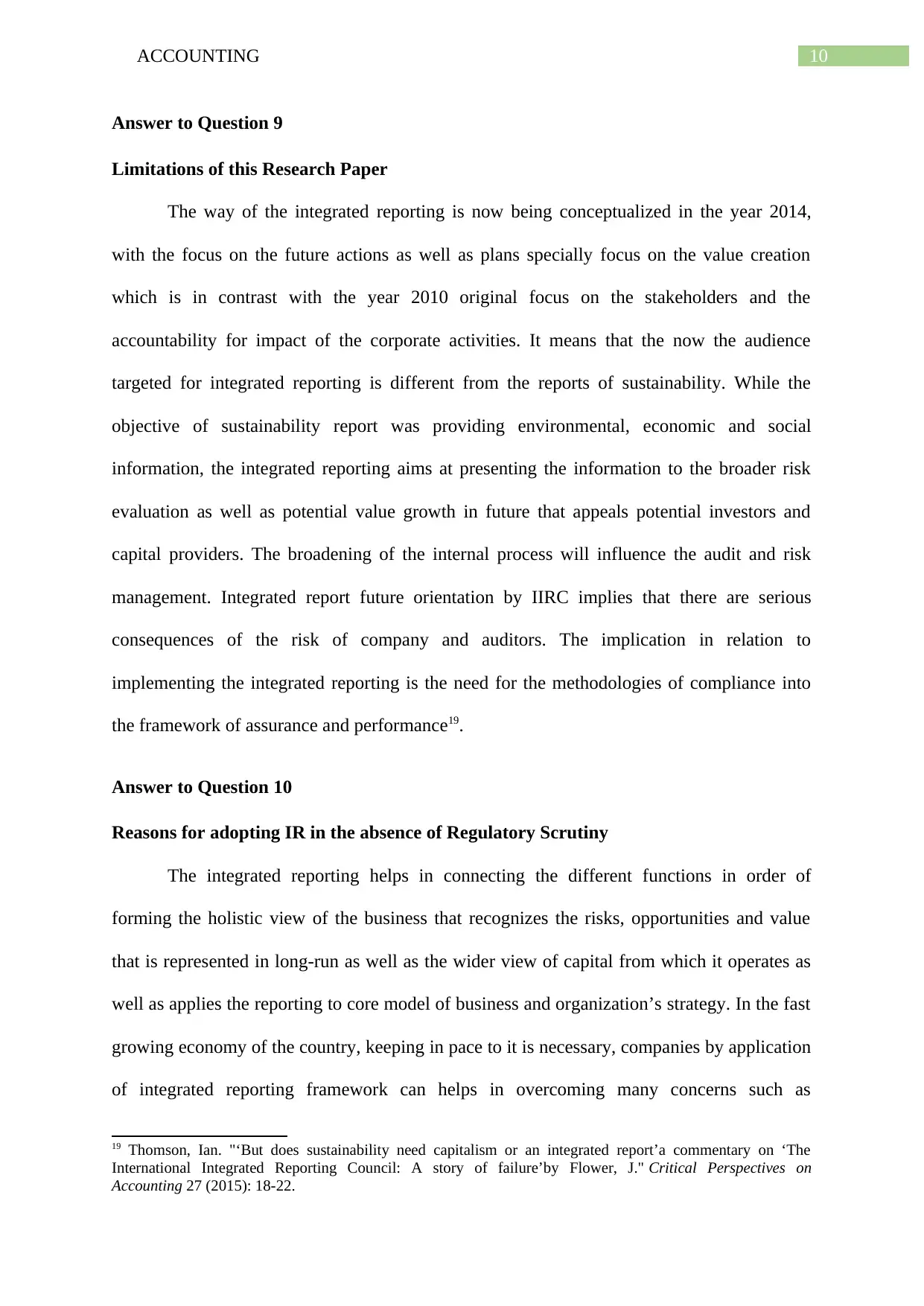
10ACCOUNTING
Answer to Question 9
Limitations of this Research Paper
The way of the integrated reporting is now being conceptualized in the year 2014,
with the focus on the future actions as well as plans specially focus on the value creation
which is in contrast with the year 2010 original focus on the stakeholders and the
accountability for impact of the corporate activities. It means that the now the audience
targeted for integrated reporting is different from the reports of sustainability. While the
objective of sustainability report was providing environmental, economic and social
information, the integrated reporting aims at presenting the information to the broader risk
evaluation as well as potential value growth in future that appeals potential investors and
capital providers. The broadening of the internal process will influence the audit and risk
management. Integrated report future orientation by IIRC implies that there are serious
consequences of the risk of company and auditors. The implication in relation to
implementing the integrated reporting is the need for the methodologies of compliance into
the framework of assurance and performance19.
Answer to Question 10
Reasons for adopting IR in the absence of Regulatory Scrutiny
The integrated reporting helps in connecting the different functions in order of
forming the holistic view of the business that recognizes the risks, opportunities and value
that is represented in long-run as well as the wider view of capital from which it operates as
well as applies the reporting to core model of business and organization’s strategy. In the fast
growing economy of the country, keeping in pace to it is necessary, companies by application
of integrated reporting framework can helps in overcoming many concerns such as
19 Thomson, Ian. "‘But does sustainability need capitalism or an integrated report’a commentary on ‘The
International Integrated Reporting Council: A story of failure’by Flower, J." Critical Perspectives on
Accounting 27 (2015): 18-22.
Answer to Question 9
Limitations of this Research Paper
The way of the integrated reporting is now being conceptualized in the year 2014,
with the focus on the future actions as well as plans specially focus on the value creation
which is in contrast with the year 2010 original focus on the stakeholders and the
accountability for impact of the corporate activities. It means that the now the audience
targeted for integrated reporting is different from the reports of sustainability. While the
objective of sustainability report was providing environmental, economic and social
information, the integrated reporting aims at presenting the information to the broader risk
evaluation as well as potential value growth in future that appeals potential investors and
capital providers. The broadening of the internal process will influence the audit and risk
management. Integrated report future orientation by IIRC implies that there are serious
consequences of the risk of company and auditors. The implication in relation to
implementing the integrated reporting is the need for the methodologies of compliance into
the framework of assurance and performance19.
Answer to Question 10
Reasons for adopting IR in the absence of Regulatory Scrutiny
The integrated reporting helps in connecting the different functions in order of
forming the holistic view of the business that recognizes the risks, opportunities and value
that is represented in long-run as well as the wider view of capital from which it operates as
well as applies the reporting to core model of business and organization’s strategy. In the fast
growing economy of the country, keeping in pace to it is necessary, companies by application
of integrated reporting framework can helps in overcoming many concerns such as
19 Thomson, Ian. "‘But does sustainability need capitalism or an integrated report’a commentary on ‘The
International Integrated Reporting Council: A story of failure’by Flower, J." Critical Perspectives on
Accounting 27 (2015): 18-22.
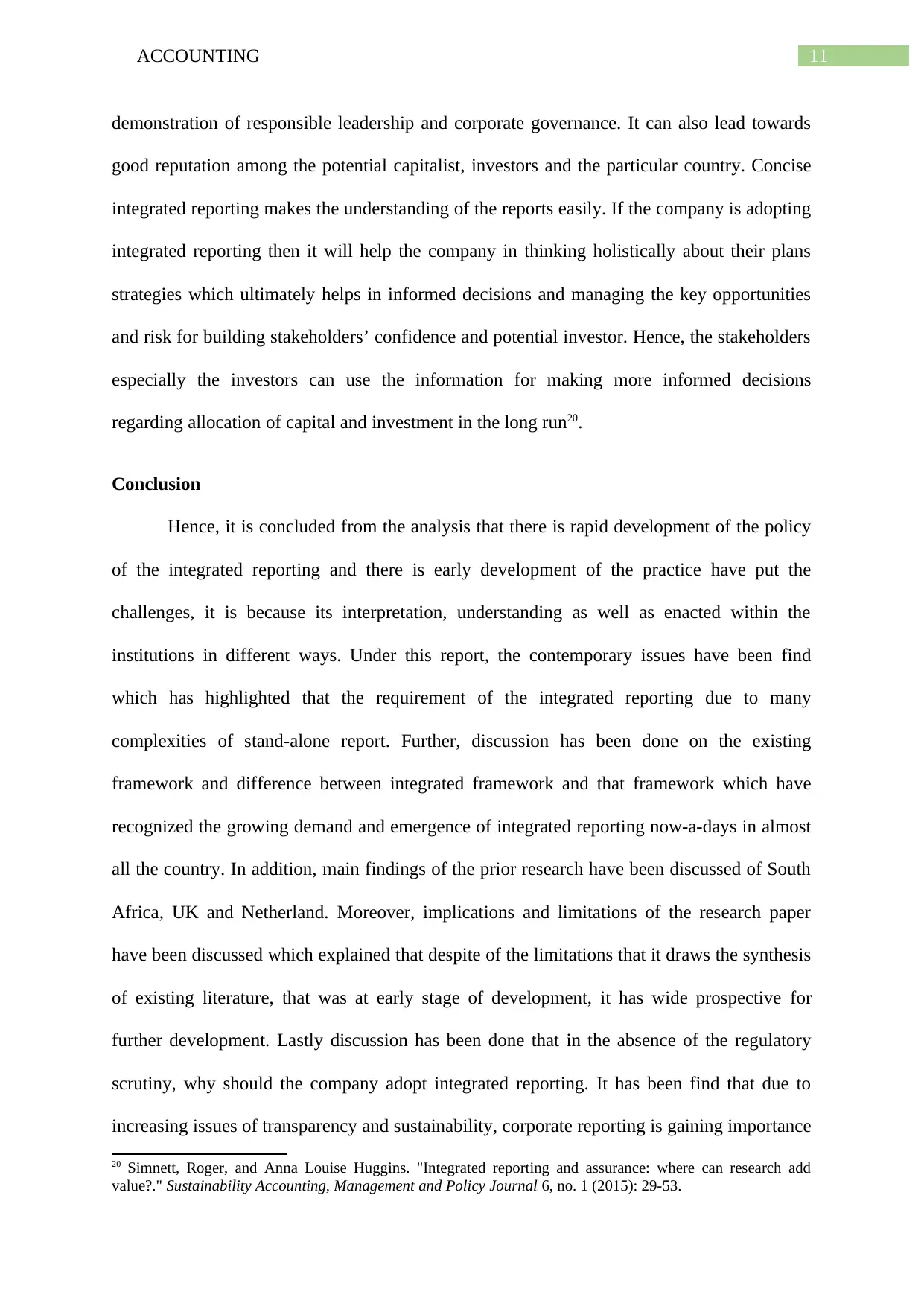
11ACCOUNTING
demonstration of responsible leadership and corporate governance. It can also lead towards
good reputation among the potential capitalist, investors and the particular country. Concise
integrated reporting makes the understanding of the reports easily. If the company is adopting
integrated reporting then it will help the company in thinking holistically about their plans
strategies which ultimately helps in informed decisions and managing the key opportunities
and risk for building stakeholders’ confidence and potential investor. Hence, the stakeholders
especially the investors can use the information for making more informed decisions
regarding allocation of capital and investment in the long run20.
Conclusion
Hence, it is concluded from the analysis that there is rapid development of the policy
of the integrated reporting and there is early development of the practice have put the
challenges, it is because its interpretation, understanding as well as enacted within the
institutions in different ways. Under this report, the contemporary issues have been find
which has highlighted that the requirement of the integrated reporting due to many
complexities of stand-alone report. Further, discussion has been done on the existing
framework and difference between integrated framework and that framework which have
recognized the growing demand and emergence of integrated reporting now-a-days in almost
all the country. In addition, main findings of the prior research have been discussed of South
Africa, UK and Netherland. Moreover, implications and limitations of the research paper
have been discussed which explained that despite of the limitations that it draws the synthesis
of existing literature, that was at early stage of development, it has wide prospective for
further development. Lastly discussion has been done that in the absence of the regulatory
scrutiny, why should the company adopt integrated reporting. It has been find that due to
increasing issues of transparency and sustainability, corporate reporting is gaining importance
20 Simnett, Roger, and Anna Louise Huggins. "Integrated reporting and assurance: where can research add
value?." Sustainability Accounting, Management and Policy Journal 6, no. 1 (2015): 29-53.
demonstration of responsible leadership and corporate governance. It can also lead towards
good reputation among the potential capitalist, investors and the particular country. Concise
integrated reporting makes the understanding of the reports easily. If the company is adopting
integrated reporting then it will help the company in thinking holistically about their plans
strategies which ultimately helps in informed decisions and managing the key opportunities
and risk for building stakeholders’ confidence and potential investor. Hence, the stakeholders
especially the investors can use the information for making more informed decisions
regarding allocation of capital and investment in the long run20.
Conclusion
Hence, it is concluded from the analysis that there is rapid development of the policy
of the integrated reporting and there is early development of the practice have put the
challenges, it is because its interpretation, understanding as well as enacted within the
institutions in different ways. Under this report, the contemporary issues have been find
which has highlighted that the requirement of the integrated reporting due to many
complexities of stand-alone report. Further, discussion has been done on the existing
framework and difference between integrated framework and that framework which have
recognized the growing demand and emergence of integrated reporting now-a-days in almost
all the country. In addition, main findings of the prior research have been discussed of South
Africa, UK and Netherland. Moreover, implications and limitations of the research paper
have been discussed which explained that despite of the limitations that it draws the synthesis
of existing literature, that was at early stage of development, it has wide prospective for
further development. Lastly discussion has been done that in the absence of the regulatory
scrutiny, why should the company adopt integrated reporting. It has been find that due to
increasing issues of transparency and sustainability, corporate reporting is gaining importance
20 Simnett, Roger, and Anna Louise Huggins. "Integrated reporting and assurance: where can research add
value?." Sustainability Accounting, Management and Policy Journal 6, no. 1 (2015): 29-53.
⊘ This is a preview!⊘
Do you want full access?
Subscribe today to unlock all pages.

Trusted by 1+ million students worldwide
1 out of 16
Related Documents
Your All-in-One AI-Powered Toolkit for Academic Success.
+13062052269
info@desklib.com
Available 24*7 on WhatsApp / Email
![[object Object]](/_next/static/media/star-bottom.7253800d.svg)
Unlock your academic potential
Copyright © 2020–2026 A2Z Services. All Rights Reserved. Developed and managed by ZUCOL.



